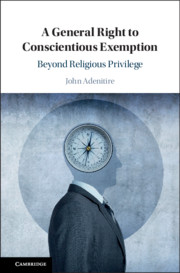Book contents
- A General Right to Conscientious Exemption
- A General Right to Conscientious Exemption
- Copyright page
- Contents
- Acknowledgements
- 1 Introduction
- 2 The General Right to Conscientious Exemption in US Law
- 3 The General Right to Conscientious Exemption in US Law: Beyond Religious Privilege?
- 4 The General Right to Conscientious Exemption in Canadian Law
- 5 The General Right to Conscientious Exemption in Canadian Law: Beyond Religious Privilege?
- 6 The General Right to Conscientious Exemption in UK Law
- 7 The General Right to Conscientious Exemption in UK Law: Beyond Religious Privilege?
- 8 The Liberal Model of Conscientious Exemptions
- 9 Balancing the General Right with Sexual Orientation Discrimination
- 10 Conclusion
- Index
7 - The General Right to Conscientious Exemption in UK Law: Beyond Religious Privilege?
Published online by Cambridge University Press: 27 July 2020
- A General Right to Conscientious Exemption
- A General Right to Conscientious Exemption
- Copyright page
- Contents
- Acknowledgements
- 1 Introduction
- 2 The General Right to Conscientious Exemption in US Law
- 3 The General Right to Conscientious Exemption in US Law: Beyond Religious Privilege?
- 4 The General Right to Conscientious Exemption in Canadian Law
- 5 The General Right to Conscientious Exemption in Canadian Law: Beyond Religious Privilege?
- 6 The General Right to Conscientious Exemption in UK Law
- 7 The General Right to Conscientious Exemption in UK Law: Beyond Religious Privilege?
- 8 The Liberal Model of Conscientious Exemptions
- 9 Balancing the General Right with Sexual Orientation Discrimination
- 10 Conclusion
- Index
Summary
The chapter argues that the general right to conscientious exemption in UK law is not only available to religious objectors. Either under Art 9 or anti-discrimination legislation, the relevant statutory materials and case law explicitly make the right available to objections grounded in religious and non-religious beliefs. As associated case law makes clear, what is important is not the religious nature of the beliefs at hand but whether those sincerely held beliefs satisfy the Dignity, Importance and Intelligibility Requirements set out in the chapter. It is argued that allowing non-religious belief-holders to invoke the general right to conscientious exemption has not made that right unmanageable. This is because few holders of non-religious beliefs have so far actually invoked the right. So far, only in four cases has the right been invoked by a holder of a non-religious belief in the entirety of reported UK case law. Finally, the criteria necessary for the successful enjoyment of the right ensure that unmeritorious claims can be dismissed. It follows that the fact that the general right to conscientious exemption under UK law is not a privilege of religious individuals and does not undermine the manageability of the general right.
- Type
- Chapter
- Information
- A General Right to Conscientious ExemptionBeyond Religious Privilege, pp. 212 - 225Publisher: Cambridge University PressPrint publication year: 2020

